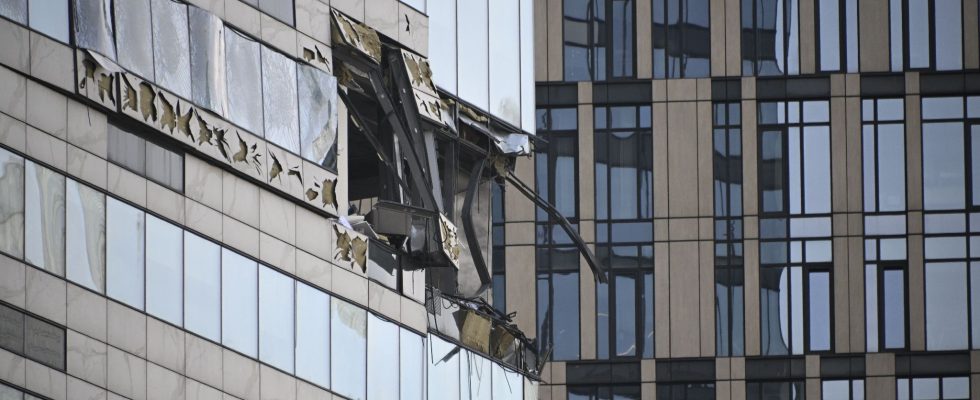Russian shelling of Ukraine continued between Saturday and Sunday. In a small town in the northeast of the country, Sumy, the police this morning reported a Russian strike that hit an “educational establishment” last night. The attack allegedly took place on Saturday evening around 8 p.m., according to the public media. suspendedcausing at least one civilian casualty and five injuries, according to Sumy police on Telegram messaging.
Earlier in the day, another strike from Moscow on the major city of Zaporizhia in southern Ukraine killed “a man and a woman”, said city council secretary Anatoly Kurtev, also through Telegram. An attack “in an open area” which also injured another woman according to the same source.
Two buildings in Moscow hit by drone attack
The night was restless on the Russian side. The mayor of the capital Sergei Sobyanin said on Sunday July 30 on Telegram that an attack by three Ukrainian drones on Moscow damaged two office buildings overnight. According to the elected official, “the facades of two office towers in the city were slightly damaged. There were no victims or injuries”. An AFP photographer also noted that windows have been blown out and that documents scattered on the ground are visible around the buildings.
If he is delighted to have “thwarted” the attack, the Russian Ministry of Defense qualified this act as an “attempted terrorist attack”. In response, the authorities announced the temporary closure of Moscow’s Vnukovo international airport. At the beginning of July, Russia had already indicated that it had shot down five Ukrainian drones, which had disrupted the operation of this airport.
Russia claims to have foiled an attack by 25 drones in Crimea
The Moscow attack denounced by Russia does not seem to have been the only one, since the Russian Ministry of Defense also indicated this Sunday morning that its forces had foiled a night attack in Crimea carried out by 25 Ukrainian drones. This peninsula annexed by Moscow since 2014 would indeed have been the target of a swarm of drones: “Sixteen […] were destroyed by anti-aircraft defence,” the ministry said in a statement.
In addition, “nine other Ukrainian drones were neutralized by electronic warfare means and crashed in the Black Sea”, added the Russian body. However, the attack did not cause any casualties according to the same source.
Putin defends his crackdown on voices critical of the war
The Russian president persists and signs. On Saturday July 29, Vladimir Putin defended his growing repression against Russian voices critical of his offensive in Ukraine. The autocrat answered the question of a journalist from the Russian daily Kommersant, asking him if the recent arrests of a political scientist and a director were “normal”. In response, the Russian leader felt “that we must adopt a certain attitude towards people who cause us damage inside the country”.
Renowned political scientist and leftist Boris Kagarlitsky was charged this week with “public calls for terrorism” and remanded in custody for expressing his public opposition to the war, while Yevgenia Berkovitch was arrested in early May for “apology of terrorism” following a play telling the story of Russian women marrying Islamists in Syria. Vladimir Putin, however, claimed to hear their names “for the first time” and “not really understand what they did or what was done to them”.
Saudi talks on peace in Ukraine
Saudi Arabia continues to play on two counts. Saudi officials told AFP on Saturday that Riyadh plans to hold peace talks for the war in Ukraine soon. These talks are scheduled for August 5 and 6 in the city of Jeddah. Saudi Arabia wants to summon as many representatives from Ukraine as from Western powers and developing countries, according to these officials.
They also say countries like the UK and Japan are expected. Likewise, several other developing countries that had attended the Copenhagen peace meeting last month are expected to attend, according to the wall street journal, like Brazil. By contrast, three Gulf-based officials say Russia will not attend the meeting.
South African opposition boycotts BRICS to support Putin
It is an unexpected call for a boycott. On Saturday July 29, the Economic Freedom Fighters (EFF) party, the country’s third political force, gathered 90,000 people in a Johannesburg stadium to celebrate its tenth anniversary. An opportunity taken by its president, Julius Malema, to ask world leaders not to come to the next summit of the five major emerging powers of the Brics (Brazil, Russia, India, China, South Africa), scheduled for August 22 to 24. in Johannesburg. A boycott “in solidarity with President Putin”, indicates this opposition figure.
A South African diplomat has indeed recently revealed that the Russian president has given up visiting the country to avoid “compromising” the event. His presence indeed presented a dilemma: Vladimir Putin has been targeted since March by a warrant from the International Criminal Court (ICC) for war crimes in Ukraine. Although Moscow disputes it, his arrival on South African soil, a member of the ICC, would theoretically have forced the police to arrest him.
